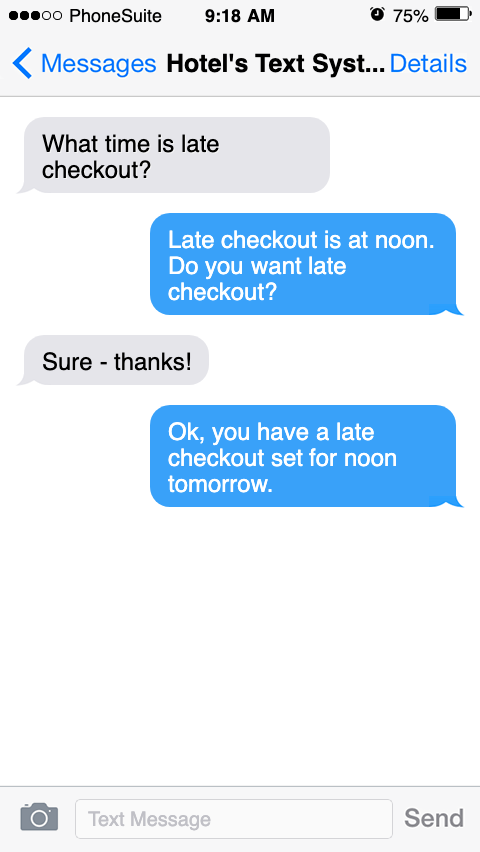As is true in many industries, hotel technology news and seminars seem to be circling around hot new tech trends and buzzwords like AI (Artificial Intelligence), blockchain, and 5G.
While some of this in-vogue tech holds promise for hospitality, aside from AI, it is future tech, not currently available. We aren’t ready for it yet – there is no vendor offering some practical application to today’s hotel. So let’s separate the practical from the trendy, the work from the fun, the meal from the dessert.
Practical Technology
In a recent Hotel News Now article, leading hotel IT leaders claim to be spending most of their IT budgets for 2019 on back-of-the-house software that will help streamline operations (for efficiency, i.e. savings), minimize disparate systems (for more efficiency and savings), and reduce staff (ditto).
Savings is important, but don’t overlook the increased guest satisfaction that should come from more efficiently knowing and then meeting their needs.
Probably the most overlooked yet noteworthy aspect of hotel technology today is the lack of disruption, or even simple innovation, in the PMS arena. As the core of the hotel’s overall technology systems, the PMS has the most potential for evolving and improving. Yet the biggest national brands remain attached to clunky systems whose core remains stone-aged (1980s) in terms of software technology base.
A single independent (from a specific brand) PMS provider dominates the rest of the industry. There seems to be no pressure on them to innovate, yet they are and remain “ahead of” the aforementioned clunkers in terms of features and capabilities. Hoteliers are thankful for simple feature adds and enhancements. Perhaps safety over innovation is key with this core technology.
The PMS remains the hub of the hotel’s data world. All hotel tech systems, both guest facing and back of the house, interact with it. It’s understandable that from one of the largest hotel chains in the world to the simple independent boutique hotel, hoteliers discover quickly how painful it is to transition from an out of date system to something more modern. Most decide it just isn’t worth it.
There is potential for disruption of this paradigm: no doubt there is a young company out there thinking about how to usurp that iron throne. They’ll need a dragon or two and some real magic. (Please, no leeches.)
No surprise here, but the single most important guest-facing technology in terms of cost (regular refresh required) and guest expectation is the WiFi. If the guest HSIA solution is slow or in any way difficult to access and use, that will produce a series of complaints on TripAdvisor or Yelp, and the hotel WILL suffer from it. Kind of sad, isn’t it, to know that the ever-increasing technology refresh budget goes to a service that nobody will ever rave about in their online feedback, but will quickly roast the hotel about if it isn’t up to their expectations.
Hoteliers must keep this guest technology amenity operating at least close to the current state of the art for home and office use. Stringent brands require a full HSIA/WiFi refresh every 3 years. Imagine the cost.
In terms of guest-facing technology, the current challenge involves just how guests want to use all that bandwidth they are demanding. Online streaming of entertainment continues to climb as a percentage of guest HSIA use, with more than 65% of hotel guests hoping to stream their own content to the in-room TV. Simplicity of use is key, and a solid, dependable, works-for-everyone solution is on its way no doubt – but not here yet.
Technology Provider Consolidation
Overall, there is a trend toward consolidation of systems. Hotel technology executives are faced with an ever expanding array of needed tech, so vendors who offer multiple, integrated or at least streamlined installation and operation of systems are often favored over single-solution providers.
This kind of consolidation should theoretically lower, not raise, the costs, since companies are able to piggyback installation teams and core backbone (network and cabling) work on multiple systems.
What’s New
So what is “new” and actually here in hotel technology? Interactive guest text and chat systems that meet the modern guest on a communication platform they prefer (texting versus a phone call) to request services or ask questions is becoming “a real thing”. At least four companies offer a solution that includes a guest-to-staff texting system, some with strong rules based systems (not to be confused with claims of being “AI”) to automatically give guests correct answers.

Add to these some new Alexa / Siri / Google Assistant devices that are finally evolving into something that is both usable and trustworthy in the guest room, doing exactly the same thing but with voice interaction.
HITEC 2019 is around the corner, so stay tuned — no doubt there will be more to say once we see what the industry vendors have to show us.
- Hotel News Now: How hoteliers are setting their tech budgets for 2019, 05 SEPTEMBER 2018
- Hospitality Technology, Hotel Internet Services Survey of Hoteliers and Guests Reveals Latest
- Hospitality WiFi Trends and Expectations, 04/03/2019



